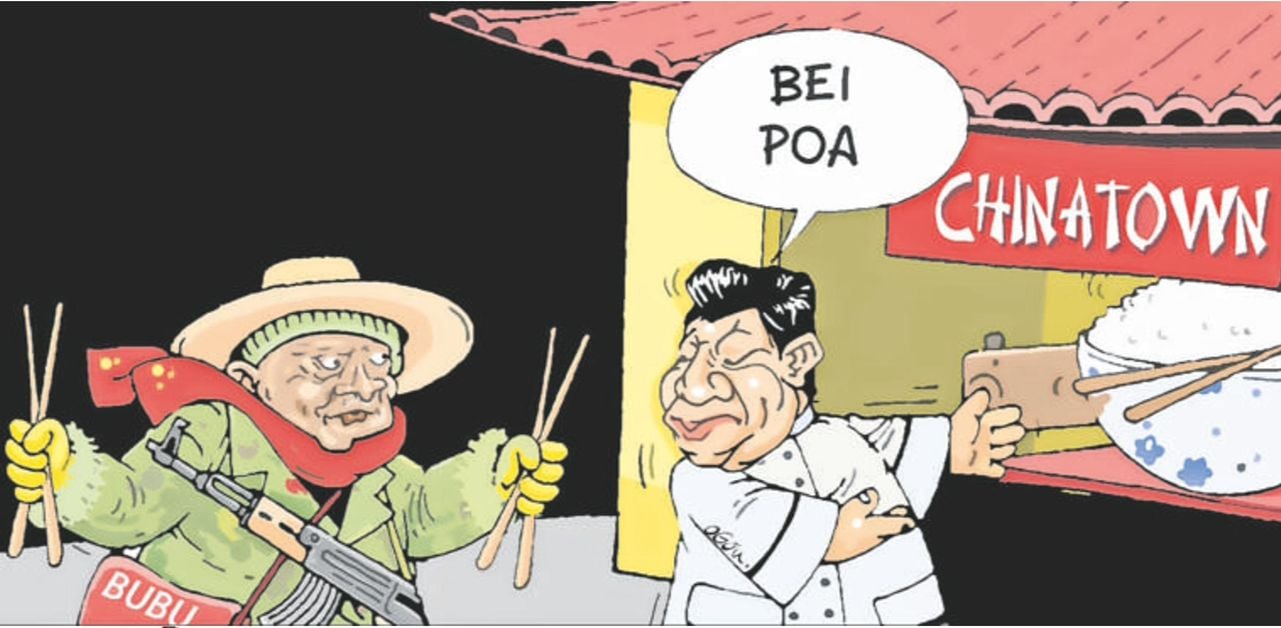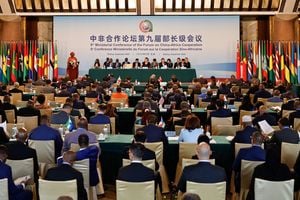
Customers in queues as they waited to enter the China Town super store in Lugogo on September 4, 2024. PHOTO/MICHAEL KAKUMIRIZI
Kampala’s supermarket landscape is witnessing a new kid on the block in the name of China Town Super Store. The newcomer is not like your common supermarket store – far from it. Its business model is like a long-awaited blessing to the shoppers who for long endured the price pain imposed on them by the local traders.
The Chinese retail store, in many ways, exposes the predatory nature in which most local traders who frequently charge exorbitant prices for merchandise that, despite being imported, should not be so expensive.
And when China Town Super Store opportunity struck, consumers couldn’t wait to dispose of their hard-earned income.
“I have bought a TV and a cell phone at half the price in a downtown shop. You cannot believe I spent just about half a million shillings to purchase a 42-inch TV and mobile phone,” Ms Jessica Nalunkuma excitedly told Prosper Magazine, last week.
With the highly discounted prices, Ms Nalunkuma wasn’t the only one to dash to the Chinese retail store. Multitudes of people in Kampala and the surrounding suburbs thronged the Lugogo-based Chinese retail store for products ranging from electrical appliances, computers, mobile phone handsets, textile products and back-to-school items.

A police officer stopping customers from accessing China Town on September 4, 2024 after it was temporarily closed. PHOTO/MICHAEL KAKUMIRIZI
“Consumer is the King and the Chinese know this,” the director of Makerere University Business School (MUBS) Economic Forum, Dr Fred Muhumuza, told Prosper Magazine when contacted last week on Wednesday.
He continued: “Most manufacturers will neither lose nor gain because the store does not have their products, but traders whose products come from China stand to lose greatly. But the consuming Ugandans won’t mind that.”
Traders up in arms
Indeed, the traders through their umbrella associations are already up in arms citing unfair competition, demanding the Chinese to leave the retail space for the local traders, many of whom are ardent predatory merchants.
Although many traders contribute little to the country's manufacturing base, trade analysts acknowledge the validity of their concerns that Chinatown stores could potentially drive them out of the market.
China dominates the mass production of consumer goods. In May 2024, the U.S. announced new increases in trade tariffs on $18 billion worth of Chinese imports covering key and strategic industries such as electric vehicles (EVs), solar panels, and semiconductors.
In 2023, the EU Parliament warned that Chinese overproduction of batteries as a result of state aid could jeopardise European firms and strategic autonomy, with China projected to produce four times as many batteries as it needs by 2030.
Just last week, Volkswagen announced the likelihood of shutting down some of its factories due to increasing pressure from Chinese electric vehicle manufacturers which have lower costs and higher profit margins. To put it into context, if Volkswagon, whose valuation of $56.5 billion is bigger than Uganda’s GDP is feeling the effects of China’s overproduction, Uganda has to worry as “our Kiira EVs may not stand a chance in the presence of the Chinese Dragon,” argues researcher Kiiza.
The bad and the ugly
According to an analysis penned by Mr Africa Kiiza, a PhD Fellow, Faculty of Business, Economics and Social Sciences; Universität Hamburg, the strategy that China Town Super Store has is nothing short of an aggressive strategy capable of decimating competition through aggressive price undercuts or price wars at a rate which, if other existing supermarkets and local traders adopted, would likely send them under.

A police officer seated outside the closed China Town entrance on September 4th 2024. PHOTO/MICHAEL KAKUMIRIZI
Business analysts like Mark Ruhindi argue that the reason for this enchantment is that China Town stores have enough cash to burn through over the midterm to carve out market share and build goodwill quicker than the conventional route of winning customer trust and confidence over the long haul.
As a result, this is bad news not only for the local manufacturing sector but it will also increase the trade deficit with China.
The Finance Ministry projects Uganda’s trade deficit at $ 247.93 million as of June 2024, with East Asia specifically China and India accounting for over 82 per cent which is about $ 205.4 million of the deficit.
Mr Kiiza analysis also reveals that e-Commerce platforms such as Jumia has exacerbated the situation with the largest percentage of listed products inclding electronics, jewellery, clothing and toys being Chinese, stalling ‘Buy Uganda Buy Uganda’ (BUBU) implementation. For that, there is no guarantee that such mega-stores will adhere to the obligation of allocating 50 per cent of their shelf space to local products.
“As a result, Chinatown stores, and local importers will exacerbate the financial haemorrhage by turning Uganda into an import economy which is a death blow to the much-coveted aspiration of building an independent, integrated and self-sustaining national economy,” Mr Kiiza writes.
On value addition and industrialisation that the government has since made a policy, import products stocked in these stores and sold at 50 per cent discount only stands to derail, if not bury the import substitution agenda – replacing imported goods with locally manufactured products.
For example, those skilled under the Presidential Skilling programme in welding and metal fabrications, shoe making, tailoring and design, and carpentry and joinery will not be able to compete with China Town Store.
How can a skilled youth who makes a dining set and sells it at Shs800,000 break even when China Town store which sells the same imported set at Shs250,000 in an economy where 20 per cent of the population is poor and nearly 50 per cent of the 22.8 million working Ugandans earn less than Shs250,000 per month, as per Bank of Uganda estimates and the EPRC study. This directly defeats the Buy Uganda Build Uganda (BUBU) policy whereby 20 per cent of Government procurement by value should be of local products and services.
Investing in common user facilities and ensuring access to viable credit for those in value addition, while implementing government procurement of such products under BUBU will create a steady and assured market necessary to keep these enterprises afloat as they develop their competitive capacities.
If not, China which has since solved the production and financing challenges will continue to do what it does best – flooding the country with discounted products made in China.
Sustainable business model?
When contacted on Wednesday last week, the Secretary to the Treasury, Finance Ministry, Mr Patrick Ocailap, told Prosper Magazine that China Town Super Store emergence should not raise an eyebrow as consumers are simply responding to the price factor which, he hopes is augmented with quality products.
“In economics, we don’t normally panic on such issues,” he said, adding, “let us see if this business model is sustainable. Maybe they have studied the market and are responding to the market needs and that is why people are there.”
He continued: “This also shows you that people have money. That there is disposable income. If it wasn’t there, then you wouldn’t see them there. Another thing from an economic point of view is that this presents an opportunity to collect revenue made from sales.”
Worries
From trade policy direction, he is concerned that this is not in line with import replacement and export promotion policy. For that, he says, there is a need to export more value added products to neutralise foreign exchange lost by activities of China Town Super Store.
During the year ending April 2024, Uganda’s exports increased by $2.534 billion to $ 7.471 billion compared to $4.938 billion in April 2023, representing a 34 percent growth. This increase was largely driven by increased exports of gold, coffee, oil re-exports, sim-sim, tobacco, cotton, and light manufactured products. Revealing perhaps, the major destinations of Uganda’s exports are the East African Community (EAC) countries which account for 29 percent, COMESA at 29 percent, Middle East 24 percent, and Asia where China is located, comes at the tail end with 20 percent.
For now, the manufacturers are watching the space.
Uganda’s exports to China
Speaking during the unveiling of the sponsors of Uganda Manufacturers Association (UMA) 30th trade fair exhibition last week, the umbrella association chairman, Mr Deo Kayemba, said eventually the dust will settle and business will continue as usual, noting that manufacturers have always encountered the likes of China Town Super Store.
For trade competition experts, the issue of under cutting on price is a non-compete matter which is trade in competition against another. According to the executive director of Fidelis Leadership Institute, Ms Pheona Wall, this situation also raises concerns regarding fairness in taxation compliance.
Additionally, Uganda passed the Competition Act in February this year and regulations to set it in motion are yet to be provided. For now, she says, “We need to see if all is well in the area of fair competition.
According to Ms Wall, the exceptions to such behaviour would be if it is in public interest and if they are high-quality goods at fair prices. She argues that in a free market economy, the forces of demand and supply should be allowed to thrive but within the ambit of the law. Currently, the institute is partnering with the Comesa competition commission in training and raising awareness around competition and consumer protection.

A trader sells merchandise in Kampala. PHOT/MICHAEL KAKUMIRIZI
As for Ms Jane Nalunga, a trade and investment analyst, the establishment of China Town Super Store in Uganda is likely to have far-reaching implications on the Ugandan economy and stifle local producers and industrialisation efforts. Because it will increase unfair competition for local businesses, potentially leading to market saturation and decreased demand for Ugandan products.
“The government should be clear on what our development and industrialisation plans are. The government must be intentional and deliberate on our economic growth strategy and manage the implications arising out of the establishment of the likes of China Town,” concluded Ms Nalunga.
Increased competition from cheaper imports might deal a blow to Uganda’s ambition to industrialise.
Currently, the Chinese are facing restrictions on their products in many markets, something that explains why Chinese are targeting more emerging markets. But these low-priced Chinese goods ill make it difficult for smaller local businesses to thrive.








